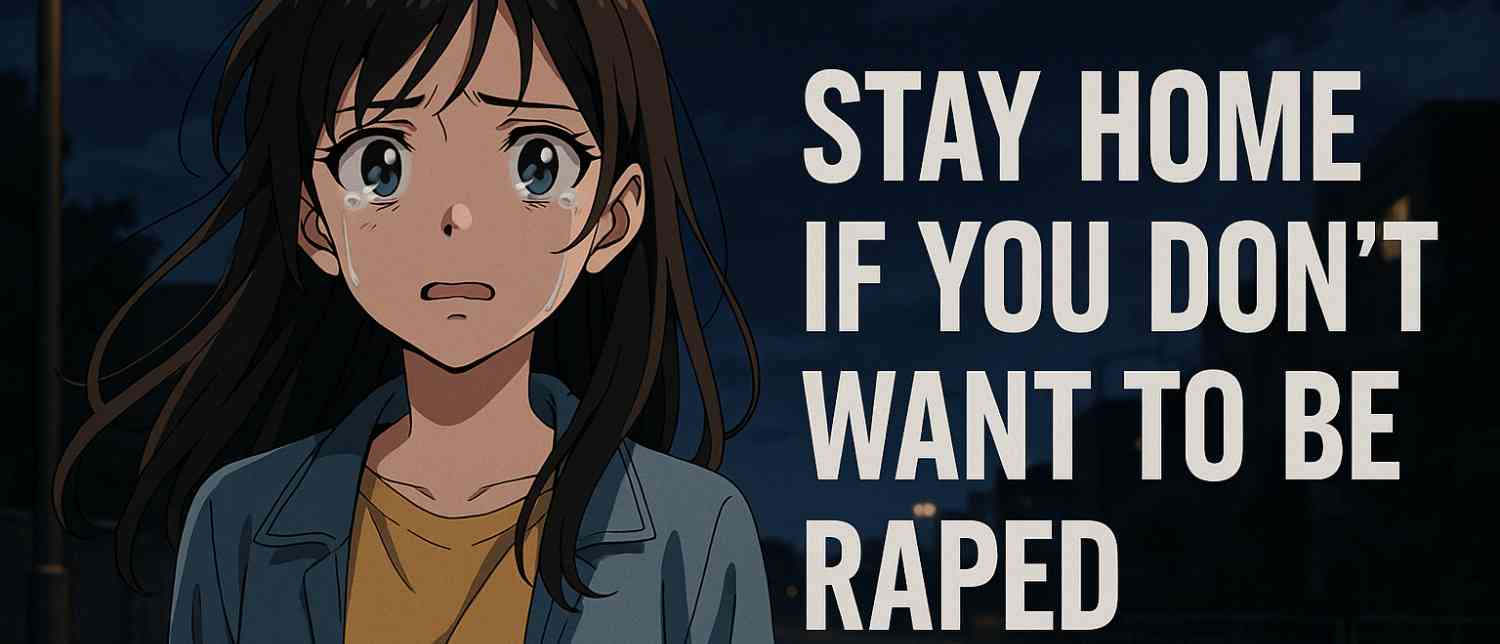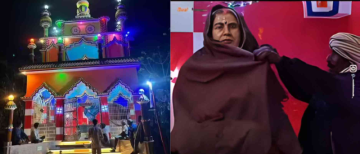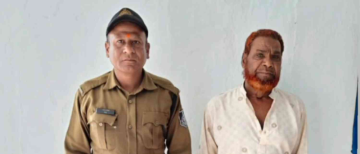In a nation that claims to champion women's empowerment, what message are we truly sending when the only advice we can offer our daughters is: Stay home if you don't want to be raped?
This is not the plot of a dystopian novel. It’s the reality that unfolded on the streets of Ahmedabad, Gujarat, where a series of disturbing posters bearing chilling warnings were plastered across public spaces. The posters, allegedly backed by the city’s traffic police, were meant to promote "safety." Instead, they managed to push a narrative steeped in victim-blaming, fear, and a stunning failure of institutional responsibility.
The posters, which appeared in Sola and Chandlodia areas, carried shockingly regressive messages:
"Do not attend late-night parties, you could be raped or gangraped."
"Do not go with your friend to dark, isolated areas. What if she is raped or gangraped?"
Let that sink in.
These weren't anonymous internet comments or underground flyers by fringe groups. They were posters allegedly under official sanction, initially believed to be sponsored by the Ahmedabad Traffic Police — the very authority entrusted with ensuring public safety. Whether intended or not, the messaging was clear: Women, your freedom is a risk factor. Your presence in public, especially after dark, is an invitation to violence.
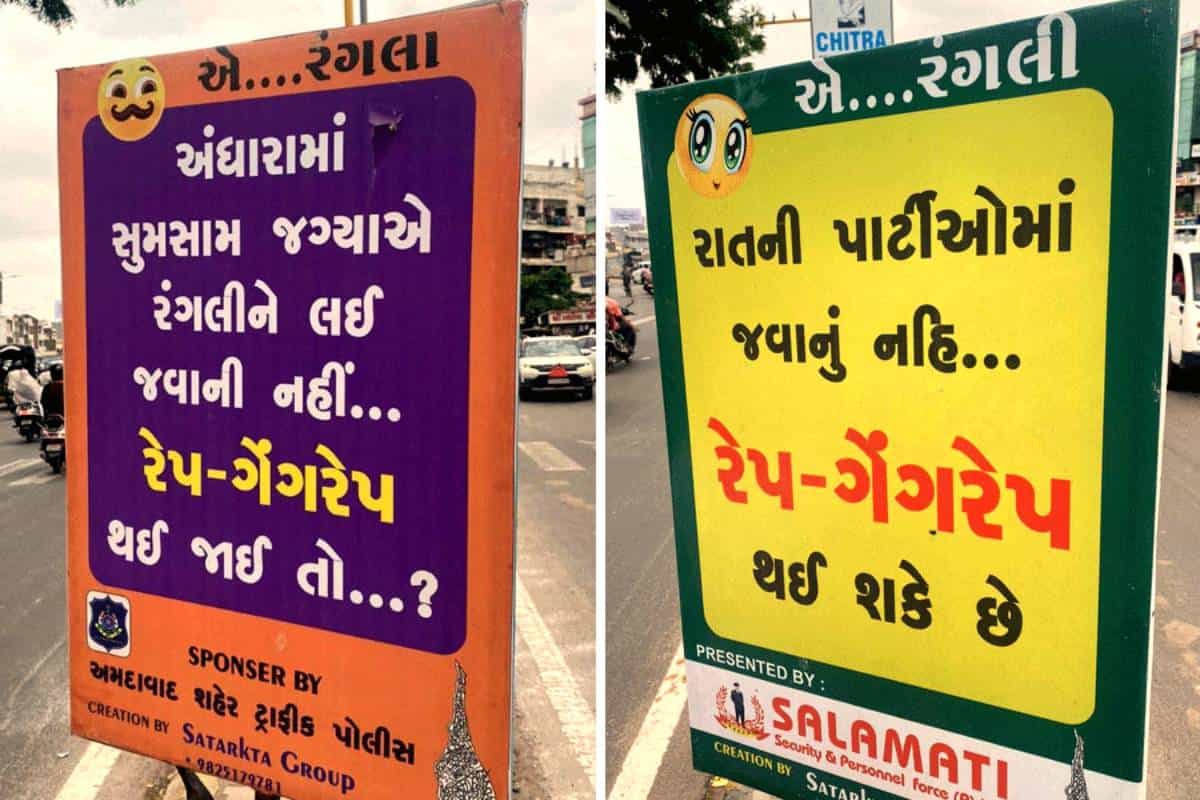
Shifting Blame, Evading Responsibility
The immediate backlash was swift and justifiable. Citizens, activists, and political parties alike demanded accountability. Under intense pressure, Deputy Commissioner of Police (Traffic West), Neeta Desai, clarified that the traffic police had only approved posters for road safety, not women’s safety.
According to Desai, the controversial content was the work of Satarkta Group, an NGO that had sought police support for a traffic awareness initiative. She claimed the police were shown innocuous traffic-related posters, and the disturbing ones related to sexual violence were never approved. Desai maintained that the moment the content came to light, the posters were removed.
However, the damage was done — not just to public trust, but to the credibility of law enforcement. If content as inflammatory and misogynistic as this can make it to public walls without the knowledge of authorities, what does that say about oversight mechanisms? What does it say about the casual disregard for women's safety and dignity under the current system?
Law and Order or Fear and Silence?
The larger issue at hand isn’t merely about unauthorized posters or miscommunication. It’s about what kind of safety narrative is being normalized, and what kind of society we are constructing for our women. When state-backed campaigns — even indirectly — tell women to avoid parties, stay indoors, or fear companionship, it isn’t just bad optics; it is a deep and dangerous failure of governance.
Can safety be ensured only by staying indoors?
If the only solution to preventing rape is for women to disappear from public life, what does that say about the power of the state? What does it reveal about our policing, our justice systems, and the promises made by those in power?
This isn’t about party politics — it’s about people. And right now, the people are angry, disappointed, and afraid.
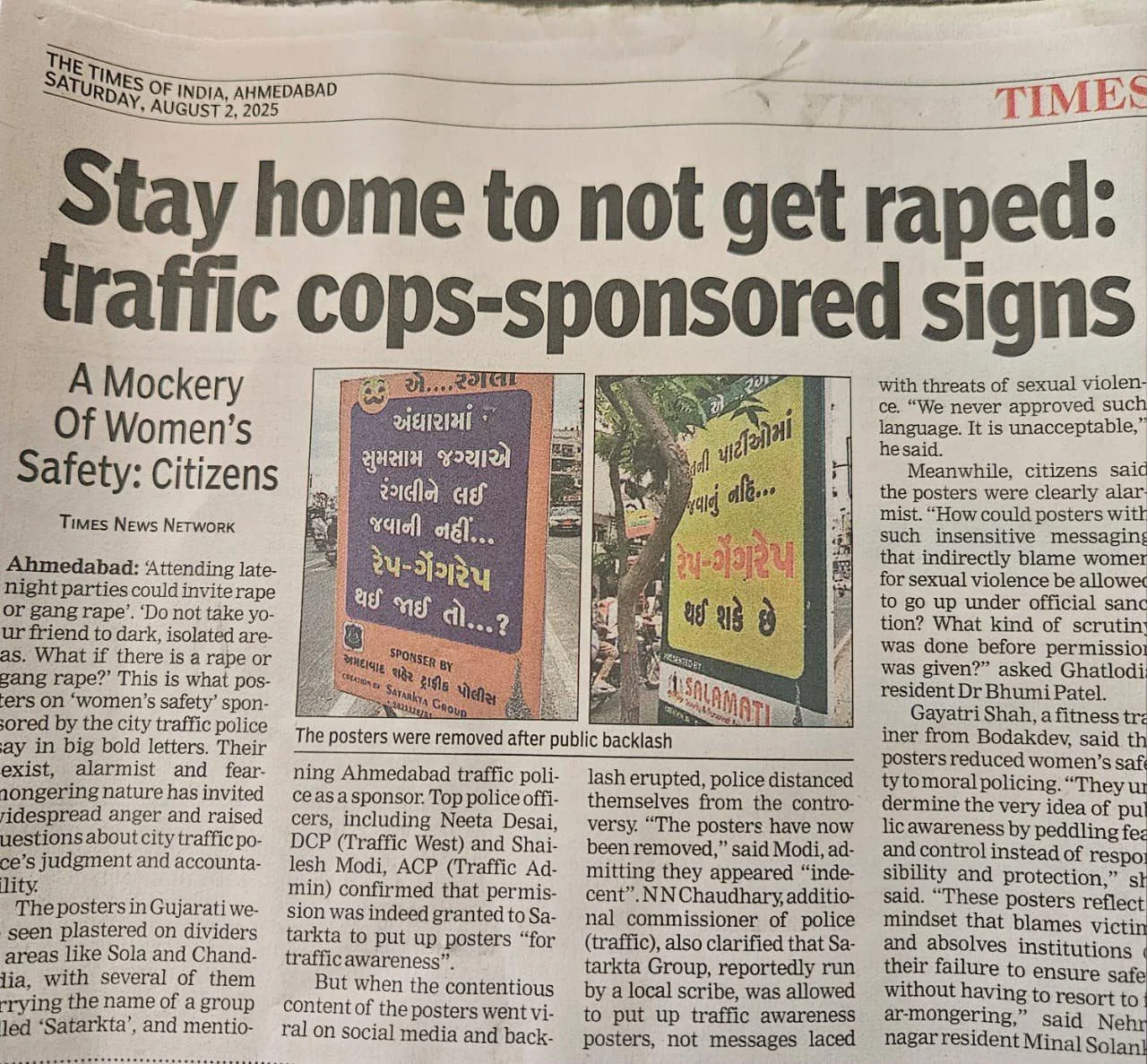
Politicians React, But Where Is the Change?
The Gujarat unit of the Aam Aadmi Party (AAP) didn’t mince words. “While the BJP talks about empowering women, the ground reality tells a different story,” the party said. In a scathing statement, it pointed out that over 6,500 rape cases — including 36 gang rapes — were recorded in Gujarat in the last three years. That amounts to more than five rapes per day.
Congress President Amit Chavda echoed the outrage: "The Home Department and Police under CM Bhupendra Patel are openly admitting defeat by telling women to stay indoors instead of ensuring their safety."
He went further to accuse the regime of instilling fear instead of protection, and for using “regressive posters” as a smokescreen for their failure to maintain law and order.
The BJP, unsurprisingly, has remained largely silent — apart from damage-control statements distancing the administration from the posters. But silence is telling. When leadership does not vocally and visibly stand up against such alarming developments, it lends credibility to them.
#WATCH | Ahmedabad, Gujarat: On poster controversy, Safin Hasan, Deputy Police Commissioner, Traffic Branch, says, "Yesterday in Ahmedabad, information was received through media and social media reports that banners had been installed in some areas. These banners feature… pic.twitter.com/ophmfyKO40— ANI (@ANI) August 2, 2025
Public Fury: "Is This What We Deserve?"
The poster controversy has struck a raw nerve in Gujarat’s civil society.
Bhumi Patel, a resident of Ghatlodia, asked: "How could posters with such insensitive messaging that indirectly blame women for sexual violence be allowed to go up under official sanction? What kind of scrutiny was done?"
Fitness trainer Gaytri Shah from Bodakdev expressed similar frustration: "These posters make a mockery of women’s safety. They reduce it to moral policing — peddling fear and control instead of protection and responsibility."
Minal Solanki from Nehrunagar didn’t hold back: "They reflect a mindset that blames the victim and absolves institutions of their failure."
And therein lies the truth. These posters weren’t just poorly worded. They were symptoms of a larger sickness — a patriarchal, regressive mindset that prioritizes control over compassion, silence over solutions, and victim-blaming over justice.
A Poster, A Message, A Mirror to Society
Let’s be clear: these posters are not just a blunder. They are a reflection of how deeply broken our approach to women’s safety is.
Safety is not a private privilege. It’s not something women should have to “earn” by modifying their behavior, dressing modestly, avoiding fun, or sacrificing their freedom.
Safety is a public right. One that must be guaranteed by the state, enforced by the law, and upheld by society. When a system instead warns its citizens to stay hidden in fear, it isn’t functioning — it’s surrendering.
આ ગુજરાત કોને બનાવ્યું?
અમદાવાદમાં ગુજરાતની વાસ્તવિકતા વ્યક્ત કરતા બોર્ડ લાગ્યા અને લખવામાં આવ્યું છે કે "રાતની પાર્ટીઓમાં જવું નહીં, રેપ - ગેંગરેપ થઈ શકે છે."@khbarot pic.twitter.com/pY0eNRPdBa— AAP Gujarat (@AAPGujarat) August 1, 2025
The Bigger Question: What Kind of India Are We Building?
This controversy may have begun in Gujarat, but it holds a mirror to the entire country. Are we building a nation where a woman’s best chance at survival is silence, submission, and seclusion? Are we comfortable with a world where institutions shrug off accountability, and NGOs are allowed to plaster city walls with fear instead of facts?
Because if the only safety advice we can offer is “don’t go out,” then we’re not protecting women — we’re punishing them for existing.
Let this moment serve as a wake-up call. Not just for the government of Gujarat, but for every policymaker, every police officer, and every citizen.
Safety isn’t just about staying indoors. It’s about building a society where no woman fears the outdoors to begin with.
That’s not a dream — it’s a duty.
With inputs from agencies
Image Source: Multiple agencies
© Copyright 2025. All Rights Reserved. Powered by Vygr Media.

